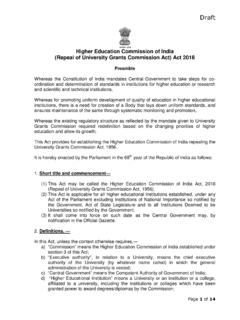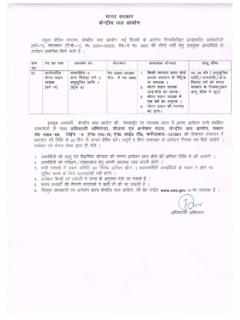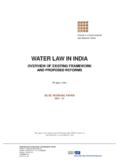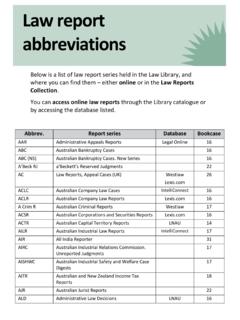Transcription of No. 1/32/2013-IR Government of India Ministry of Personnel ...
1 No. 1/32/2013-IR . Government of India Ministry of Personnel , Public Grievances & Pensions Department of Personnel & Training North Block, New Delhi Dated: the 28th November, 2013. OFFICE MEMORANDUM. Subject: Guide on the Right to Information Act, 2005 - updated Version. Section 26 of the RTI Act requires the Government to compile a guide containing such information, in an easily comprehensible form and manner, as may reasonably be required by a person who wishes to exercise any right specified in the Act. Further, it requires the Government to update the guide at regular intervals.
2 Accordingly an updated Guide on the Act is hereby published online which would help all the stake-holders viz. information seekers in getting information, public information officers in dealing with the RTI applications, first appellate authorities in taking cogent decisions on appeals and the public authorities in implementing various provisions of the Act in right earnest. (SANDEEP JAIN). Director Tel: 23092755. DISCLAIMER. Though all possible care has been taken to ensure accuracy and consistency, in the event of a conflict between the Guide and Government orders/ instructions on the subject, the latter will prevail.
3 Any information given herein cannot be cited in any dispute or litigation, nor is it a substitute for a legal interpretation/ evidence. The user will be solely responsible for any consequence of the decision taken on the basis of information contained in this Guide. 2. GUIDE ON RIGHT TO INFORMATION. ACT, 2005. 3. The right to information is implicitly guaranteed by the Constitution. However, with a view to set out a practical regime for the citizens to secure information as a matter of right, the Indian Parliament enacted the Right to Information Act, 2005. This law is very comprehensive and covers almost all matters of governance.
4 This Law has a wide reach, being applicable to Government at all levels- Union, State and Local as well as to the recipients of substantial Government funds. 2. The present guide is an updated and consolidated guide for the use of all stake- holders. This guide contains five parts. Part I of the guide discusses some aspects of the Act which all the stake-holders are required to know. Rest of the four parts are specifically relevant to the public authorities, the information seekers, the public information officers and the first appellate authorities respectively.
5 3. Contents of this guide are specifically relevant in relation to the Central Government but are equally applicable to the State Governments except in relation to rules about payment of fee or deciding of appeals by the Information Commissions. It may be noted that this guide uses the term Public Information Officer in place of Central Public Information Officer/State Public Information Officer. Likewise Assistant Public Information Officer has been used for Central Assistant Public Information Officer/State Assistant Public Information Officer and Information Commission for Central Information Commission/State Information Commission except where it was considered necessary to make specific reference to the Central Public Information Officer/Central Information Commission etc.
6 4. Part I. FOR ALL STAKEHOLDERS. Object of the Right to Information Act 4. The basic object of the Right to Information Act is to empower the citizens, to promote transparency and accountability in the working of the Government , to contain corruption, and to enhance people's participation in democratic process thereby making our democracy work for the people in a real sense. It goes without saying that an informed citizen is better equipped to keep necessary vigil on the instruments of governance and make the Government more accountable to the governed. The Act is a big step towards making the citizens informed about the activities of the Government .
7 What is Information 5. Information is any material in any form. It includes records, documents, memos, e-mails, opinions, advices, press releases, circulars, orders, logbooks, contracts, reports, papers, samples, models, data material held in any electronic form. It also includes information relating to any private body which can be accessed by the public authority under any law for the time being in force. What is a Public Authority 6. A "public authority" is any authority or body or institution of self Government established or constituted by or under the Constitution; or by any other law made by the Parliament or a State Legislature; or by notification issued or order made by the Central Government or a State Government .
8 The bodies owned, controlled or substantially financed by the Central Government or a State Government are also public authorities. Non- Government organisations substantially financed by the Central Government or a State Government also fall within the definition of public authority. The substantial financing by the Central Government or a State Government may be direct or indirect. The Act does not define substantial financing. Various courts/Information Commissions have been deciding on this issue on case to case basis, depending upon the merits of each case. 5.
9 Public Information Officer 7. Public authorities have designated some of its officers as Public Information Officers. They are responsible to give information to a person who seeks information under the RTI Act. Assistant Public Information Officer 8. These are the officers at sub-divisional level to whom a person can give his RTI. application or appeal. These officers send the application or appeal to the Public Information Officer of the public authority or the concerned appellate authority. An Assistant Public Information Officer is not responsible to supply the information.
10 9. The Assistant Public Information Officers appointed by the Department of Posts in various post offices are working as Assistant Public Information Officers for all the public authorities under the Government of India . Right to Information under the Act 10. A citizen has a right to seek such information from a public authority which is held by the public authority or which is held under its control. This right includes inspection of work, documents and records; taking notes, extracts or certified copies of documents or records; and taking certified samples of material held by the public authority or held under the control of the public authority.















